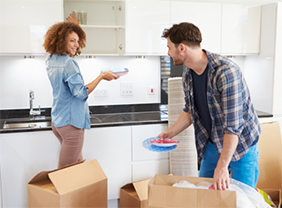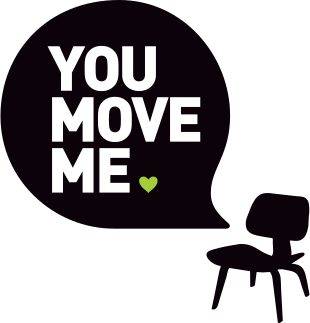How to Organize Your New Kitchen

Moving is a long and arduous process. You spend weeks, sometimes months, planning and obsessing over the minutest details of your move so that there are no surprises (or shocks!) on moving day. However, the process does not end there. Once you move into your new house, you have to again spend at least a few days unpacking and organizing your stuff before it finally starts feeling like “home”!
With the kitchen undoubtedly being the heart of any home, it does not come as a surprise that most people decide to unpack and organize this space first. But actually, there are a few things you can do even before the move to make sure that you have your new kitchen up and running in no time at all.
Before the move: Sort and purge
Though it may seem easier to dump all your belongings in the packing boxes without going through them first, carting along unnecessary stuff to your new home is only going to add to your stress when the time comes for unpacking and putting them away.
So before you begin packing, take all the stuff out of your kitchen cupboards and place them in the center of the room. Take a deep breath and discard all extra and unnecessary items that you haven’t used for years.
Are you still holding on to those cute, plastic sippy cups that your kids used when they were toddlers? It’s okay to keep one or two for sentimental reasons, but toss away the rest, and save on some valuable storage space in your new kitchen. And seriously, does anyone really need three garlic peelers and two melon scoopers?
Make sure that all pots with missing handles, broken dishes and chipped glasses go into the “toss” pile. Items that are in good condition can be donated to charity. The onion chopper that someone gifted you five years ago, the popcorn maker that you never use, the pasta maker that has never seen the light of the day in your home are all good candidates for the “donate”or “sell” pile.
After the move: Get organized

A new kitchen is like a blank slate and offers you a fresh chance to completely change the way you cook and eat food. Unpacking and dumping your stuff in the closest cupboards may get the job done faster, but it is going to cause you a whole lot of trouble in the long run. On the other hand, a well-organized kitchen makes cooking easy and fun for years to come. What’s more, it’s easier to keep track of your kitchen supplies when everything is stored in their rightful place.
As a first step to organizing your new kitchen, demarcate specific zones for preparation, cleaning, baking, cooking, storage and so on. Make a note of how you want to arrange your stuff and what goes where.
Organizing Your Dishwasher and Sink Areas
The counter should be kept clean and as free of objects as possible, except for, of course, your prized coffeemaker. Your daily glasses, plates, coffee mugs, dishes and dish towels should be stored in cabinets closest to the dishwasher and sink. This makes it easier to put them away after washing. If your cutlery drawer is across the kitchen and away from the dishwasher, chances are that you’ll end up putting off the unloading task for later. Your cleaning supplies and dishwashing products can go in a basket under the sink.
Organizing Your Cooking utensils
Cooking utensils, pans and spatulas are best stored in cabinets next to the store and oven. The spices, oils, and seasonings that you need on a daily basis should also be stored somewhere nearby and easily accessible. If you are storing your spices in a drawer, remember to label the tops of your cans so that you can easily locate the one you need.
Organizing Your Paraphernalia
As a rule, keep most often used items in a place that is easy to reach. Dishes that are used only on special occasions can be stored in higher cabinets or above the refrigerator.
Tupperware that you use for storing leftovers can be stored in a separate drawer or plastic bin, along with their lids. Use an old tissue box for storing your plastic grocery bags.
Organizing Your Baking supplies
Knives and chopping boards should be stored near your prep area. If you do a lot of baking, store flour, sugar, baking powder, measuring cups and spoons, mixing bowls, and rolling pins near the baking area. Keep separate shelves for snacks, canned goods, cooking supplies and so on so that you can easily tell when you are about to run out of something.
For the first few days after moving, you can choose to label all your drawers and cabinets with sticky notes so that everyone in your family gets used to where things are stored in your new kitchen. You can always take them down once everyone is familiar with the new space.

